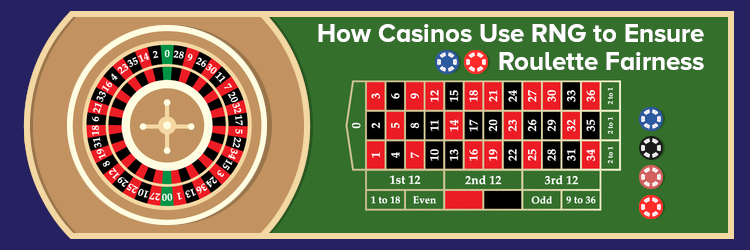
Contrary to popular belief, Roulette is much more than its strategies.
The so-called Devil’s Game, although ostensibly uncomplicated, is based on a complex algorithm. The part played by your online casino of choice is perhaps crucial. There is hard work involved before the launch of any Roulette table. One aspect of it concerns randomness. Casinos achieve this standard through RNGs.
The complexity of Roulette lies in its simplicity.
This sentence might sound like an antithesis, but you will see what we mean by the end of the article.
In this blog post, we will answer the following questions:
- What is an RNG and how does it work?
- Why do we need RNGs in Roulette online?
- What is the role of an RNG in online Roulette?
- What forms of RNGs are there?
- How do I know RNGs in Roulette are reliable?
What Is a Random Number Generator (RNG)?
First things first, let’s address the elephant in the room.
Random number generation is the process of determining a genuinely random outcome through a random number generator (RNG). The device generates a string of numbers that otherwise could not be predicted objectively.
The generators take resemblance from actual physical games such as rolling of dice or coin tossing. The basic principle is that – you guessed it – the outcome comes at random.
In terms of online gambling, casino games are divided into two categories: games of luck or chance, and games that require a skill. Roulette is in its essence a game of chance. We have indeed spoken our fair share of Roulette tactics. Nevertheless, the protagonist role is played by randomness.
Understanding that Roulette a combination of the two (luck and tactic), we will focus on the former for now.
Why Do Casinos Use RNG for Roulette?
Fairness cannot be guaranteed without an RNG.
To start with, RNGs are a preferred method for guaranteeing randomness in Roulette because of the nature of the game. As anyone who’s ever played Roulette knows, there is a single result for every spin of the wheel. Therefore, it is very easy for the device to generate the outcome.
This en avance calculated result ensures that absolutely no one knows where the Roulette ball will land.
The software algorithm in the RNG creates a streak of entirely random numbers. Then they are moulded to fit the format of the Roulette wheel. Depending on your favourite variant, the wheel might have 37 or 38 pockets. French Roulette goes from 0 to 36; the American variant possesses an extra 00 (double zero) pocket.
This way, not only does the casino not know the result, but it is also hidden from players. Should there be a dishonest customer at the table, he or she could not determine the outcome.
A disclaimer remains – as Roulette is a guessing game of sorts, a player will guess the winning pocket every now and then. However, the RNG prevents this from happening continually, or too many times in a row.
How Casinos Use Random Number Generators?
Casinos love to let Lady Luck work her magic. This is especially true in the case of Roulette. The utilisation of Random Number Generators has entirely eliminated cheating.
As we said, the device was created to simulate the core of games such as shuffling of the cards or flipping of a coin. To do so, an RNG deploys an algorithm. This set of rules is used to design a string of random numbers. The process is completely computerised, and the final calculation is unbiased.
In simple terms, random number generators are the casino’s best friend. Their services are employed in other casino games, especially slots and video poker.
Finally, let’s see who controls the operation of the generators.
Random number generators are examined and certified by independent auditing firms. One of the most prominent ones is eCOGRA (eCommerce Online Gaming Regulation and Assurance). Based in the United Kingdom, the acclaimed testing agency has been monitoring online casinos since 2003.
This regulatory organ uses system analysis to scrutinise RNG operations. Every online gambling venue strives to obtain the eCOGRA seal of approval.
